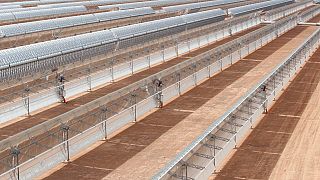Morocco
In Morocco, efforts to grow the country’s $2 billion-a-year aerospace industry are part of a years-long push to transform the largely agrarian economy through subsidizing manufacturers of planes, trains, and automobiles.
Officials hope it dovetails with efforts to grow Moroccan airlines, including the state-owned Royal Air Maroc.
“There is a market today. Today, the global international supply chain is suffering. Morocco has a good opportunity and a good positioning in terms of the aeronautical industry," says Royal Air Maroc CEO Abdelhamid Addou.
Safran Aircraft Engines sends Boeing 737s and Airbus 320s to a repair plant outside of Casablanca every six to eight years and then sends them back to airlines from countries including Brazil, Saudi Arabia, the United Kingdom, and Ireland.
The French engine manufacturer is among the 130 aerospace companies active in Morocco, where parts ranging from wings to fuselages are produced in an industry that employs 42% women — a proportion that industry lobbyists say is larger than its European and North American manufacturing industry counterparts.
Though many companies eye Morocco as a source for comparatively cheap labor, the industry and government have worked to train skilled workers at IMA, an institute for aeronautics professions in Casablanca.
“Morocco is doing all it could to satisfy investors with their needs for qualified human resources," says Mohammed Abdeljalil, Morocco's Minister for Transport and Logistics.
“It’s the access to well qualified talents who have been well trained. They are the key players for achieving our goals to rise in competence," adds Safran CEO Jean-Paul Alary.
Despite hopes among its cheerleaders, the air travel industry faces headwinds.
When demand rebounded after much air travel stopped during the pandemic, manufacturers faced challenges building enough planes to meet demand from airlines.
For Boeing, delays caused by supply chain issues were compounded by high-profile emergencies and deadly crashes that further curtailed deliveries.
From eastern Europe to southeast Asia, new levels of demand have forced manufacturers to seek out new locations to build and repair parts.













01:00
Bear disrupts flights at Yamagata Airport, forces runway closure
01:21
Wisk Aero: The electric flying taxis billed as the future of aviation
01:33
Families of Air India plane crash victims begin to receive bodies
01:29
Haiti sees first domestic flight in seven months take off from Port-au-Prince
02:24
Racial profiling still rife across the EU, Council of Europe says
01:10
Plane lands at Heathrow as airport resumes limited operations following fire